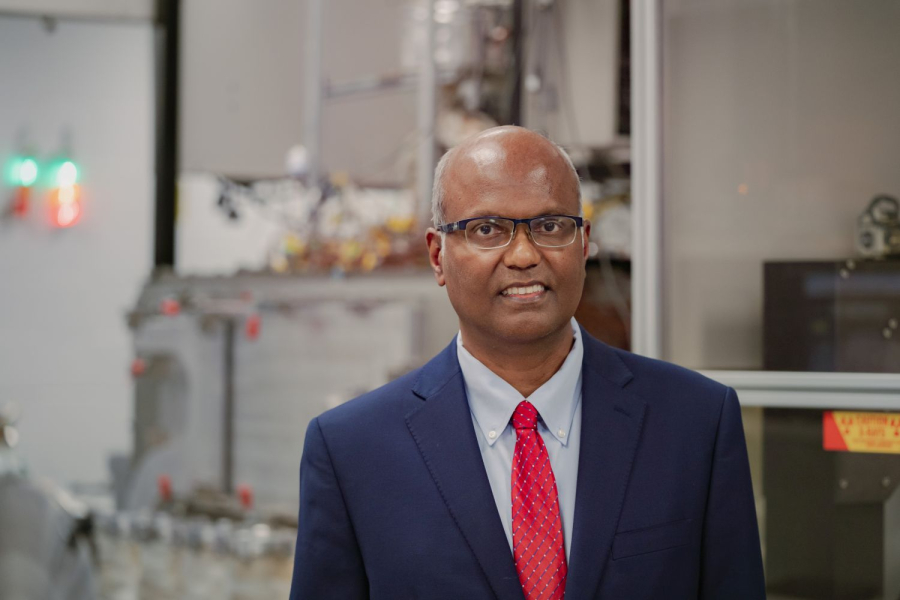University of Houston Transitioning Energy Innovations Into the Real World
The U.S. Department of Energy recently announced a $10 million investment in three projects to develop novel technologies to manufacture high-performance superconducting tapes in the United States. Two of the projects are built on the foundations of cutting-edge research from the University of Houston.
The DOE values superconductivity because it means zero wasted electricity. Superconductivity, found only in certain materials, allows direct electric current to be conducted with zero resistance and without energy loss. Widely available low cost, high-temperature superconducting (HTS) tapes are used for a broad range of clean energy applications that move the country closer to a net-zero future, including in transmission cables, the grid, electric-based motors and generators, nuclear fusion reactors, electric aviation and more. However, demand for HTS tapes is outstripping supply, the cost is high and the bulk of the manufacturing is occurring outside the U.S.
The funding, through the DOE’s Advanced Research Projects Agency-Energy’s (ARPA-E) Novel Superconducting Technologies for Conductors Exploratory Topic, will help boost different types of superconductive technologies. The three projects chosen include two in Houston and one in California.
“If we can improve superconductors and manufacture them here in the United States, we can ultimately speed up the energy transition through enabling cost savings, faster production, and improved capability,” said ARPA-E Director Evelyn N. Wang in the DOE press release. “The teams [selected] will all pursue ARPA-E’s mission to lower emissions, bolster national security, increase energy independence and improve energy efficiency through their critical research.”
UH’s Selva Research Group received $2 million for a three-year project, titled “Low-Cost, High-Rate Fabrication of High-Performance, Uniform, Long REBCO Conductors.” Their work focuses on scaling up the manufacture of the team’s high-temperature superconductor tape to implement the technology for clean energy applications. The project will scale up the advanced metal organic chemical vapor deposition (MOCVD) process developed by the team and address key metrics such as speed and cost of production, and uniformity of tape performance.
Venkat Selvamanickam, M.D. Anderson Chair Professor of Mechanical Engineering and director of the Advanced Manufacturing Institute, is recognized globally for his research to develop better manufacturing technologies for thin film superconductor tape. His team was the first to manufacture the thin film superconductor tape, which was used in 2008 to power 25,000 households in Albany, N.Y., and now is used by more than 200 institutions worldwide.
The Selva Group has demonstrated its HTS tape’s electric current-carrying-performance is three times better than the tapes available on the market. His research group works with many partners to use its HTS tape to make small-scale prototypes of magnets, coils and cables to incorporate in several applications. Now, the team is focusing its attention to make the manufacturing process for its tape more efficient and consistent.
“Even though our superconducting tape is three times better than today’s industry products, for us to be able to take it to full-scale commercialization, we need to produce it faster and at a lower cost while maintaining its high quality,” Selvamanickam said. “This funding is to address this challenge and it’s an important step forward towards commercialization of our technology.”
Houston-based MetOx Technologies Inc. received $3 million in funding for its project “MetOx Low Cost MOCVD” to advance proprietary manufacturing technology for its HTS wire. The project aims to improve equipment throughput, material efficiency and tape performance – resulting in a more cost-effective HTS product for the renewable power generation and transmissions markets.
MetOx was co-founded in 1998 by Alex Ignatiev, UH professor emeritus of physics and a fellow of the National Academy of Inventors, who also serves as the company’s chief science officer. Ignatiev applied thin film deposition technologies to the ground-breaking ‘high’ temperature YBCO material – a mix of yttrium, barium, copper and oxygen – created by Paul Chu, founding director and chief scientist at the Texas Center for Superconductivity at UH. Selvamanickam serves as a technical advisor for the company.
By end of 2023, MetOx plans to open its new manufacturing facility and the first ever large-scale production line in the US capable of producing over 1000 km of HTS per year.
“This ARPA-E funding not only allows MetOx to advance its HTS wire fabrication process that I developed at UH, but also signifies the DOE’s recognition that MetOx is important,” said Ignatiev. “The cost-effective HTS product that MetOx is developing at scale is critical to the national and global application of HTS for the world’s energy needs.”
The success of the projects inspired by UH research underscores the value UH brings to the dynamic and highly critical energy landscape.
“Obtaining this DOE funding not only showcases the caliber and strength of our research, but it also reaffirms the pivotal role UH Energy plays in leading the energy transition,” said UH President Renu Khator. “Beyond refining scalable technological advancements, the work we are doing at UH is driving the urgent shift toward a greener and more efficient energy future."
UH Vice President for Energy and Innovation Ramanan Krishnamoorti is proud of the work happening at UH, a Carnegie-designated Tier One Research University.
“These awards recognize the relevance and quality of the research at UH and our commitment to making a meaningful impact by addressing society’s needs and challenges by transitioning innovations out of research labs and into the real world,” Krishnamoorti said.
More information and complete project descriptions for the winning teams can be found on the ARPA-E website.
